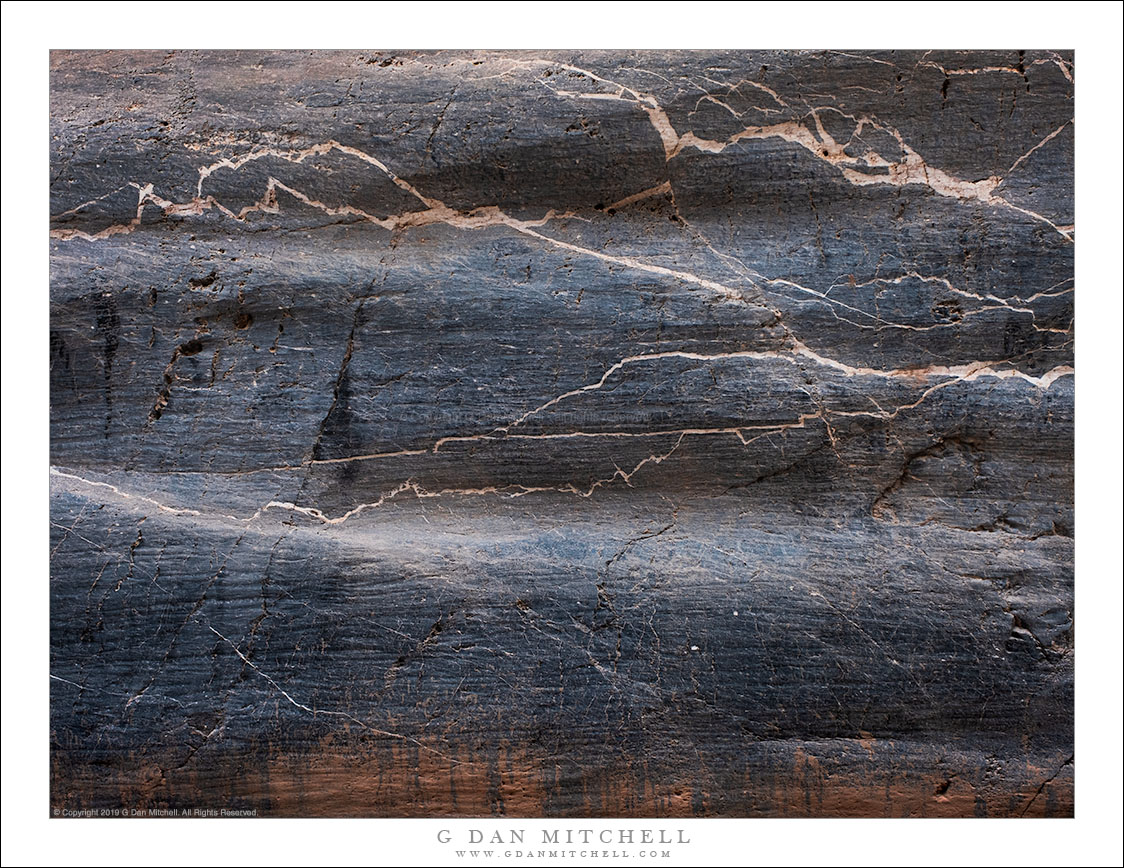
Marbled Canyon Wall. © Copyright 2019 G Dan Mitchell – all rights reserved.
Marbled stone in a Death Valley canyon wall.
This little section of canyon wall is one that I’ve marveled (marbled?) at for years, stopping there every time I visit this canyon and pondering how to photograph it. Although I find the patterns (and what they imply about the geology of this place) to be remarkable, it isn’t each to find a way to photograph them the way I want. On this visit the canyon was quite dark and the light filtering down from above was soft and blue-toned.
I am about as far from being a trained geologist as one can be. I have never taken a single course in the subject, though I have read a bit. Nonetheless, I always marvel at the record of time and geological forces that created a little spot like this. Some material was, I presume, laid down “here” over a long period of time. Additional time allowed for it to transform into rock. As geological forces on various scales did their work, cracks appeared that permitted the entrance of entirely different material to create what we see as veins — but which are perhaps better thought of as layers. Eventually the force of water (and perhaps a weakness in the structure of the rock?) exposed this rock to the light. And then I arrived to photograph it…
G Dan Mitchell is a California photographer and visual opportunist. His book, “California’s Fall Color: A Photographer’s Guide to Autumn in the Sierra” is available from Heyday Books and Amazon.
Blog | About | Flickr | Facebook | Email
Links to Articles, Sales and Licensing, my Sierra Nevada Fall Color book, Contact Information.
Scroll down to leave a comment or question.
All media © Copyright G Dan Mitchell and others as indicated. Any use requires advance permission from G Dan Mitchell.
Discover more from G Dan Mitchell Photography
Subscribe to get the latest posts sent to your email.

Dan, Living in the desert shouthwest, I often photographed walls like yours, but I have almost no interest in geology.
If a digital file seems to have some sort of promise in a print I will often [apply tone mapping]. In fact, that is often previsualized when I make the exposure. For me this is a graphic technique…the way I use it doesn’t look “unnatural” the way HDR seems commonly used.
My interest in geology is far from professional! I’m fascinated by the “stuff” it produces and how so many aspects of it are visible in the landscape — but almost every time I post something that wanders too close to expertise… actual experts come and set me straight! ;-)
Dan
Hey Dan
The surface you are looking at appears to be a fault plane with the wavy undulating sub-horizontal lines being slickenlines that show the orientation of the last movement on the fault plane. Great image!
Steve
Thanks, Stephen. I’m certainly no geologist, but your comment led me to a bit of what passes for quick “research” and that sure makes sense.
Dan